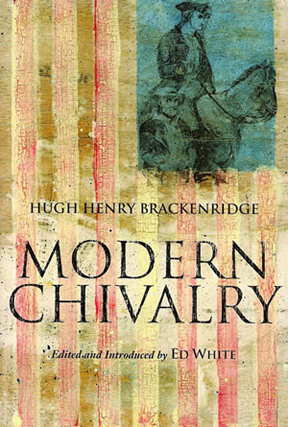Sept. 28 Panel Discussion Explores Life and Times of Pitt Founder Hugh Henry Brackenridge
 For some, the name of Hugh Henry Brackenridge may evoke images of the University of Pittsburgh’s founding or possibly Brackenridge’s literary works, which contained some of the earliest political satire written in 18th-century America.
For some, the name of Hugh Henry Brackenridge may evoke images of the University of Pittsburgh’s founding or possibly Brackenridge’s literary works, which contained some of the earliest political satire written in 18th-century America.
But a noon Sept. 28 panel discussion in Pitt’s Frick Fine Arts Auditorium will offer a fresh glimpse into the life and writings of the man who was an educator, author, lawyer, lawmaker, and a justice of the Pennsylvania Supreme Court. The event, Reading Hugh Henry Brackenridge (1748-1816), is part of the University’s yearlong celebration of the 225th anniversary of its founding. The panel discussion will offer insights and remarks from Pitt Professor Jean Ferguson Carr and Assistant Professor Courtney Weikle-Mills, both within the Department of English, and from Pitt School of Law Professor Bernard Hibbitts.
The panelists will focus primarily on Modern Chivalry, Brackenridge’s lengthy satirical novel that was published in serial volumes in Philadelphia (1792, 1797, 1815), in Pittsburgh (1793), in Carlisle (1804, 1805), and in Richmond, Va. (1815).
Brackenridge had hoped that his novel would become a “kind of classic of the English language,” competing with other important educational books, including Noah Webster’s Dictionary (1806), according to Carr, who teaches American literary traditions. One key driver of the teaching of reading, writing, grammar, and syntax in the 18th century, she said, was a national one—aimed at solidifying English as a language and source of power, both politically and culturally.
“Modern Chivalry dramatizes that quest—pitting the unworldly hero Captain John Farrago against the rough-and-tumble Western political scene and its new institutions, such as schools, a newspaper, and the law,” said Carr.
Weikle-Mills, another specialist in early American literature, said she appreciates Brackenridge’s mix of politics and humor. The frontier writer actually used storytelling and wit during the negotiations surrounding the Whiskey Rebellion, easing tension at meetings with multiple narratives and levity, she said.
“Brackenridge once attended a dinner with President George Washington and told a host of funny stories, but presidential decorum didn’t allow Washington to actually laugh,” Weikle-Mills said. “However, Brackenridge slept in the room next to Washington’s, and [he] had the satisfaction of hearing the bottled-up laughter explode when the president was out of the public eye.”
As a state lawmaker, Brackenridge sponsored the bill that created Allegheny County as well as the legislation that created the Pittsburgh Academy, which would evolve into the Western University of Pennsylvania, renamed in 1908 the University of Pittsburgh.
Hibbitts says Brackenridge’s legal training helped him frame and interpret bills. “His professional experience as a courtroom lawyer helped him persuade and cajole his colleagues on the floor of the Assembly,” he said. “As a lawyer, he moved in politically-oriented circles and used his connections in the legal community to both inform himself and leverage others.”
Brackenridge established the Pittsburgh Gazette, the first newspaper west of the Alleghenies, which would eventually become the Pittsburgh Post-Gazette. But it is Brackenridge’s own writings that give readers an idea of what it must have been like to live in Western Pennsylvania during the nation’s earliest years.
The panel discussion will conclude at 1:30 p.m. Nearby, in the Frick Fine Arts Building’s Cloister, attendees can examine, from 11 a.m. to 3 p.m., a number of historical items from Brackenridge’s time. These include Volumes 1 and 2 of Modern Chivalry (1804), other books published in Pittsburgh during the author’s lifetime, manuscripts from the Fort Pitt Trading Post Papers, and the Darlington Family Papers. The exhibition was assembled by Pitt’s University Library System.
The free historical exhibition Faces to Names: 225 Years of Pitt Chancellors’ Portraits (1787-2012) continues in the adjacent University Art Gallery. It features, among 18 other portraits, an 1810 painting of Brackenridge by Gilbert Stuart. Gallery hours are 10 a.m.-4 p.m., Monday through Friday. The exhibition runs through Homecoming Weekend, Oct. 12-14, with special extended hours: Oct. 12, 10 a.m.-8 p.m.; Oct. 13 and 14, 10 a.m.-4 p.m.
Other Stories From This Issue
On the Freedom Road

Follow a group of Pitt students on the Returning to the Roots of Civil Rights bus tour, a nine-day, 2,300-mile journey crisscrossing five states.
Day 1: The Awakening
Day 2: Deep Impressions
Day 3: Music, Montgomery, and More
Day 4: Looking Back, Looking Forward
Day 5: Learning to Remember
Day 6: The Mountaintop
Day 7: Slavery and Beyond
Day 8: Lessons to Bring Home
Day 9: Final Lessons

